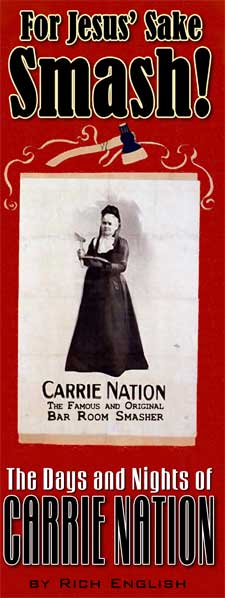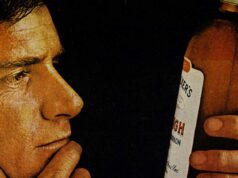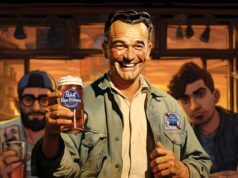 A majority of Americans today agree that our country’s 13-year “experiment” with Prohibition was a catastrophic failure.
A majority of Americans today agree that our country’s 13-year “experiment” with Prohibition was a catastrophic failure.
In truth, it failed like few human endeavors have ever failed. Compared the Amendment 18, Dean Wormer outwitted the Deltas, Charlie Brown kicked the football, and the Yugo fucking styled. Put your finger on the biggest failure you can identify then times it by about three gazillion and you’ll still equal less than one raggedy butthair on the Volstead Act’s wide white useless ass.
Historians point to lots of reasons why Prohibition went belly-up, but there’s really only one reason. Prohibition flamed out because it was insanely fuckin’ stupid. A tiny cabal of pathologically frightened jagoffs twisted congressional titties until they got their way, and then jack-stomped on everyone else’s freedom of choice.
The anti-liquor charge was lead, in the main, by the Women’s Christian Temperance Union (WCTU), and their snotty little brother, the Anti-Saloon League (ASL). To describe the WCTU as a gaggle of ill-informed harpies is to do a disservice to ill-informed harpies everywhere. They clucked, honked, bleated, squealed and made pretty much every other barnyard noise they could come up with (and don’t forget the titty twisters) and batter-rammed a law down America’s neck that would’ve done Josef Stalin a solid. The whole deal was loony tunes—except without wackiness, daffiness, or a stuttering pig.
The apex of the insanity took the form of a woman named Carrie Nation. And what a form it was. Into every movement, it might be said, a little Technicolor craziness must fall, and Carrie Nation was a species of multichannel, vibrating insanity without equal.
* * *
Carrie Nation was born Carrie Moore to the small revivalist burg of Garrard, Kentucky in 1846. She started life with two strikes against her. Her mother was certifiably insane, a hot gnashing slurry of biochemical delusion, who achieved a level of crackpottedness unheard of this side of Dorian Gray’s last slumber party. Mrs. Moore spent the last several decades of her life believing she was Queen Victoria. She forced her apparently spineless husband to build her a gilded carriage, which he did, and then instructed him to haul the thing back and forth across their plantation grounds while Mammy Moore waved a white-gloved hand at her unamused slaves. This was the gene kiln that cooked up Carrie Nation, early leader, mouthpiece, and philosopher of the temperance movement.
Daddy Moore’s plantation eventually went the way of your Enron stocks and, after a period of itinerancy, the Moore’s, with demented daughter Carrie in tow, tumbled into the small town of Medicine Lodge, Kansas. It was here that Carrie met a fellow called Charles Gloyd. Doctor Gloyd, actually, as he was the town’s sawbones. Gloyd fell head over heels for—
Wait.
A brief description of Carrie is required at this point in order that the rest of the Sawbones Gloyd story ooze the weirdness it ought.
 Carrie was a big girl. In her youth she was large and bony, but widened with age. She stood over 6’2” and eventually tipped the scales at over 250 pounds, towering over her family and neighbors. Her face, hard a-straddle a pumpkin-like head, had a pushed-up look, as if she had received an uppercut with a snow shovel. Even with a little age-weight she looked, not just obese, but rather like a great flesh cube hovering free in space like a hellish parade float. She wasn’t ugly, either, not in any reasonable sense of the word. Instead, she radiated that sort of high-impact corpulence common to talk radio hosts and Babar cartoons. Add to this her predilection for loud public conversations with Jesus, whom she called “Big Brother,” and she is a picture perfect example of the sort of repellently hostile and irrational being that has no other option available in life but to engage in grassroots politics. Carrie was about as lovable as a flak jacket filled with raw sausage.
Carrie was a big girl. In her youth she was large and bony, but widened with age. She stood over 6’2” and eventually tipped the scales at over 250 pounds, towering over her family and neighbors. Her face, hard a-straddle a pumpkin-like head, had a pushed-up look, as if she had received an uppercut with a snow shovel. Even with a little age-weight she looked, not just obese, but rather like a great flesh cube hovering free in space like a hellish parade float. She wasn’t ugly, either, not in any reasonable sense of the word. Instead, she radiated that sort of high-impact corpulence common to talk radio hosts and Babar cartoons. Add to this her predilection for loud public conversations with Jesus, whom she called “Big Brother,” and she is a picture perfect example of the sort of repellently hostile and irrational being that has no other option available in life but to engage in grassroots politics. Carrie was about as lovable as a flak jacket filled with raw sausage.
So, then, back to Medicine Lodge, Dr. Charles Gloyd, and how he fell head over heels for Carrie Moore.
Gloyd landed on the Moores and Carrie with the gusto of a Yangtze River rat falling on the floating corpse of a Shanghai opium dealer. It was a whirlwind courtship. In only a few months, Gloyd wooed his female giant into a white dress and a marriage bed. “Bed” and “Carrie Nation” aren’t words in harmony, but those are the facts. Lots of words clang yet still get sentenced together, so why quibble. It’s important to understand that the Gloyd/Moore union was consummated, and after about a year of wedded bliss Carrie gave birth.
In addition to being the town doctor, Gloyd was also the town sozzlehead; the Otis of Medicine Lodge. Carrie later claimed to have been unaware of her husband’s reprehensible habits, which included not just rampant hooching, but also smoking and membership in the Freemasons. Whatever the case, Carrie’s baby was stillborn and riddled with deformities, for which she blamed Gloyd’s seed, tainted, as it was, by “demon drink.”
The marriage slowly dissolved, withering under Carrie’s rancid scorn. Only days after the divorce was final, Charles Gloyd died, which he must’ve preferred to a continuance of life with Carrie.
The circumstances of her child’s death, followed by the divorce and Gloyd’s passing, fertilized Carrie’s insanity, and she stepped up her attacks on the world’s evils: smoking, drinking, Freemasonry and sex. So great was her hatred of sex that Carrie began stalking young couples out on strolls or buggy rides, lurking behind bushes and leaping out at her unfortunate victims armed with an umbrella and ear-splitting religious rancor. During this time she was still a revered member of the WCTU and spent time with other members of the group picketing and singing hymns outside saloons. Far from being regarded as the town kook, Carrie’s neighbors looked on her as someone you shouldn’t mess with.
A few years after Gloyd’s death, Carrie met the man whom she felt God had “destined” her to marry. His name was David Nation.
A perennial loser, Nation must’ve looked at Carrie’s romantic attentions as something he’d better go with lest he fail every aspect of his life. Over the years, before and after meeting Carrie, David Nation tried his hand at cotton farming, running a hotel, haberdashery and preaching. He was ordained, but conducted boring sermons in a small, quaking, voice that entirely lacked the hellfire of the times. Carrie would often sit in the front pew and holler prompts at the man, and when he floundered too much would end the service herself with a “that’s enough for today, David.”
David Nation doted on his new wife, and, more importantly, was sober, sharing Carrie’s vehement dislike of quickening liquids. But to Carrie, the best part of her new relationship was her new name. With it, said “Big Brother” Jesus, she would now have the power to “Carrie a Nation” forward into godly abstinence (she would at one point change her name from Carrie to Carry so her motto would make more sense.)
* * *
Kansas had been legally dry since 1860, first among the gaggle of annoying mid-western states who prefigured Prohibition. Most people, however, considered the dry laws a joke, and all but a handful of citizens looked the other way regarding alcohol. Not even the cops bothered much, as most of them understood that they were being forced to act in accordance with a law they thought was totally dopey.
Medicine Lodge, Kansas, small as it was, contained seven saloons for the comfort of local drinkers, as well as a drugstore than purveyed illegal spirits as patent medicines. The WCTU occasionally protested these establishments, parking their carcasses outside to sing hymns, chant temperance poetry, and inform customers as to the peril of their eternal souls. Carrie Nation participated in all WCTU actions, but seemed to find their tactics lacking a certain something. During one of her delusional chats with “Big Brother” Jesus, He compared Carrie to Joan of Arc and suggested that she undertake more extreme measures. Now fueled with the rapturous fire of the Lord, Carrie wasted little time in…uh…carrying out His wishes.
One sunny morning in 1899, Carrie Nation and one lone WCTU sycophant, attacked the Medicine Lodge drugstore. She burst through the doors in a spitting fury. Armed with a sledge hammer, she shrieked a black cloud of hell-n-brimstone at the shocked, goggling owner and his handful of customers. She called a religious fury into the hammer, raised the weapon in her two ham-sized fists and reduced a cask of whiskey to moistened splinters. Onlookers could only gape at the flailing, keening behemoth and no one did anything to stop her.
For the 53-year-old Carrie Nation, this was an epiphany. “Big Brother” Jesus had stayed the hands of the evil doers, allowing Carrie to carry out His work unmolested. From now on no one would stand between her bellowing rage and “demon drink.”
As she put it herself: “Smash! Smash! For Jesus’ sake, smash!”
* * *
The horse was, as they say, out of the chute. Emboldened by her success at the drugstore, Carrie loaded a wagon with throwin’ rocks, WCTU cronies and the sledge hammer, then set out for the nearby town of Kiowa, Kansas. Kiowa was the home of three saloons, including the somewhat legendary Dobson’s, a place known for its sophisticated appointments. Dobson’s was Carrie’s ultimate destination, as she was galled by the fanciness of this satanic den, but she elected to sack the others first as a kind of warm-up.
She ravaged the two smaller saloons, blowing through them like God’s own special tornado. Using the sledge, she demolished everything in both joints that might hold hooch, from casks and kegs, to steins and cups. Bevies of drunkards burst from the bars, scattering into the streets like so many fluttering quail.
Word reached Dobson’s of the Biblical shit storm heading their way and the owner and patrons tried to prepare but Carrie had saved plenty of energy for Act Three of her Demolition Tragedy, and no one offered even token resistance. Carrie killed all the liquor in the place, then all the receptacles, and then set about killing the place itself. She hurled rocks through windows and billiard balls through expensive imported mirrors. She sledged the furniture to death. All of it. Every table, chair, stool, gewgaw, and gimcrack fell beneath her wrath. She ripped the swinging doors from their hinges as a parting shot, a visual reminder to the entire town that they shouldn’t get in Carrie Nation’s way.
Strangely, no one did. Not one person lifted one finger to try and stop the destruction. Whether Mr. Dobson and his customers were too astonished to interfere with the crazed banshee, or too frightened, is unknown, but their inaction turned the scene of Dobson’s Saloon Massacre, and Carrie Nation, into overnight media sensations.
Celebrity came a-courtin’, and Carrie Nation was delighted to hold hands a go for a stroll.
* * *
After Kiowa, Carrie’s raids were covered by a collection of national press reporters assigned to travel with the Fury From Kansas. With her flock of goslings lined up behind, Carrie stormed the…uh…nation from coast to coast, smashing, singing and preaching. The only change to her modus operandi came when she traded her sledge hammer in for a big ol’ hatchet, thereby introducing the charming word “hatchetization” into our national vernacular. Roughly, “hatchetization” defines the actions forced upon righteous temperates in order to stave the onslaught of “demon drink” against the country’s unfortunates.
The hatchet became Carrie’s symbol, as well as a fine money-raising tool for her and the WCTU. She started a mail-order concern that distributed, in addition to autographed postcards of Carrie, and copies of her newsletter, The Smasher’s Mail, miniature copies of her famous hatchet. The postcards featured Carrie propped over a bible looking blockish and pious, and the newsletter gave voice to Carrie’s wide-ranging hatreds and petty intolerances. Her writing rambled so, and her logic was so twisted and perverse, that the Mail was, at times, unreadable. But no matter the quality of her offerings, Carrie’s knick-knack business earned her solid coin with which to finance her raids, and fanned her celebrity to full fire.
Fans composed songs and verse about their Jesus-beblubbered heroine, which can only have made Carrie’s already dizzyingly insane little brain glow like a self-righteous furnace. Her every waddling move was covered by the press and lauded by teetotalers across the land. For a long time, she was left to her own devices, raiding and smashing where ever she went with little concern that the authorities might get involved.
But then, right at the height of the “Carrie” Nation, the legal community’s testicles dropped and people began prosecuting Carrie for property damage and for being a deranged pain in the ass.
Maybe they shouldn’t have, because every trip Carrie made to a jail cell seemed to shine an ever more positive light on her and her cause. Her traveling retinue of reporters dutifully reported each arrest, but always accompanied the news with a photo of Carrie. In these photographs, Carrie was usually shown in her cell with her back to the bars hovering over a Bible like Augustus Gloop over Willie Wonka’s chocolate river. Her fans ate that shit right up. Seeing, then, how much good it did to arrest their nemesis, tavern keepers kind of gave up, choosing instead to lock their establishments until they were sure Carrie had left town.
A sorry state of affairs if ever there was one. A whole generation of peaceful drunkards held by the short hairs by a person who, in all fairness, should have been in a padded room muttering to “Big Brother” Jesus from the depths of a morphine haze.
* * *
In the end, though, it was the very fact of Carrie Nation’s celebrity that did her in and saved drinkers from any more of her particular brand of belligerent predation. She received so much coverage, got so much attention, that eventually the whole scene seemed to reach a sort of crest. On one side of the peak Carrie Nation was a heroine, while on the other her actions and demeanor quickly became the subject of ridicule and joke-making. In other words, people began to wise up and see Carrie’s rage-filled dementia for what it was.
Not to be daunted, though, Carrie hired herself an agent (who drank, by the by) and launched herself on the lecture circuit. In theaters across America and in Europe she reenacted her famous raids, “hatchetizing” empty casks to bits and warbling hymns in her toneless singing voice, while audiences hooted. In New York and Chicago she was something of a tolerable side-show attraction, but in London she was rightly seen as a dodgy menace. The first and only pub raid she staged in Britain earned her immediate arrest, a steep fine and a polite invitation to take her show back across the water. The Brits weren’t having any of this Yankee whack-job and her antics with Amerind cutlery.
Things went downhill for Carrie after this. Her supporters slowly deserted her, the WCTU denied all knowledge of her, and the press lost interest. In short order, Carrie Nation went from megastar, to laughing stock, to non-entity. After suffering one final, massive, mental breakdown that left her a jabbering loon, Carrie Nation died in 1911, locked in a cell in a mental asylum.
Eight years later America went dry.
* * *
Was Carrie Nation a true member of the American temperance movement that lead to the disaster of Prohibition, or merely part of its lunatic fringe? The WCTU would have you believe the latter, but the simple fact of her meteoric fame indicates the former. If she was Prohibition’s lunatic fringe it’s only because the whole program was lunacy. Carrie Nation is certainly an emblem of the dark desires that underlie any prohibitionist thought. That’s as true today as it was in hers.
Drunks got the last word on Mrs. Nation, however. In the mid-1920s, bootleggers set up an illegal still on a patch of unused land in central Kansas, land that happened to be what was left of the Moore family farm.
Drunkards will always win.
—Richard English
(Note: the Author is indebted to the works of Stuart Walton, Mark Edward Lender, James Kirby Martin, and Edward Behr.)










